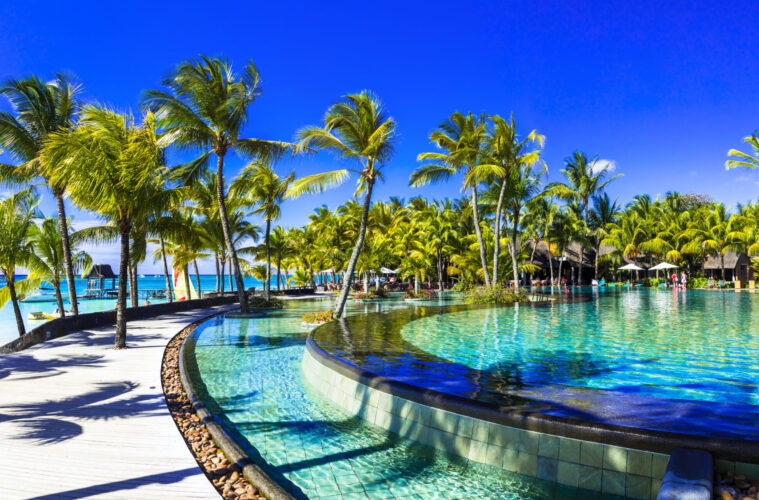Being ‘voluntarily imprisoned’ for two weeks in a hotel is an emerging trend for travellers wishing to enter certain countries. Sarah Bridge reports on the quarantine hotel experience in Mauritius
While the British government is rushing to finalise its quarantine hotel arrangements for incoming travellers, and Australia hits the headlines after more than 500 tennis players and staff return to quarantine after a positive test at the Australian Open, one country which has been quietly and successfully operating its own quarantine since March 2020 is Mauritius.
The Indian Ocean island nation took just two days to implement its 14-day hotel quarantine system – it closed its borders on March 18 and started quarantine from March 20 as it repatriated Mauritian nationals from around the world – and has been quarantining all international arrival since.
With travellers having to take a Covid-19 test before leaving their home country, another test immediately on arrival in Mauritius and subsequent tests on day seven and day 14 of quarantine, levels of coronavirus have been kept low throughout the pandemic.
Any positive cases are transferred immediately to Covid-secure hospitals but for the majority of arrivals, which include returning Mauritians and business travellers, the quarantine process is a stay in one of Mauritius’ luxury hotels. While no-one want to spend 14 days in one room, there are certainly worst places to quarantine.
My quarantine hotel experience
I flew to Mauritius for work in mid-November from the UK and at the Emirates desk at Heathrow airport I not only had to show my recent negative Covid-19 test but also proof of my accommodation in one of Mauritius’ designated quarantine hotels (there are around 30 of them ranging from three-star to five-star).
After 14 hours of flying (via Dubai) I was given another Covid test at the airport just after passport control and then ushered on to one of three waiting minibuses, which were to take arrivals to the five-star Trou aux Biches Beachcomber hotel at the northern tip of the island.
After hours of travelling, none of my fellow passengers were happy to have to wait for another two and a half hours in the bus before leaving the airport (the policy is that the entire plane is processed through immigration and the Covid tests before all leaving together) but finally we were off across the island, police outriders stopping all traffic around us as we swept through red lights.
An hour later, we were being checked in, at a make-shift outdoor reception desk and then driven by little buggies to our rooms which would be our homes for the next fortnight – and after the best part of a day I could finally remove my face mask.
Thankfully for me, my room was one of the biggest I stayed in during my visit to Mauritius. There was a large double bed, a lot of floor space, which turned out to be ideal for exercise videos, a balcony with a table, chairs and sun lounger (although annoying the entire balcony was shaded from the sun so I had to sit on my front door step at midday to get some vitamin D), a separate work area which was psychologically perfect for distancing work and leisure time, and a large bathroom with a shower, tub, separate toilet and twin sinks.
Signs that this was no ordinary hotel stay could be seen in the mop, bucket and cleaning products that had been left for me in the bathroom, along with spare bedsheets, pillow cases, towels and about 30 toilet rolls.

A sign on my door reminded me not to venture outside (there is a 15,000 rupee (£273) fine for breakouts, plus the threat of six months in jail) and from my first-floor balcony I could see that people with ground-floor rooms each had a square space on the grass outside for sunbathing and exercise marked off with police tape. How I would come to envy them their sunshine and being able to walk on the grass!
The food
I had heard horror stories about quarantine food – cold, stale, tasteless Tupperware boxes dumped outside your room – but that certainly wasn’t the situation here. Every day I’d receive several phone calls asking for my choice of menu options for the next day’s meals – there was a menu for the week that listed the many choices – and then at 8.30am, 1pm and 7pm each day there would be a polite knock on my door and I’d open it to find a large tray on a stand groaning with food.
Breakfast was as much as you liked from fruit, Danish pastries, cereal and cooked options such as eggs, omelette sausages and bacon, and like all other meals came with a vast amount of bread rolls and a litre of water. Lunch could be fish and rice, with a soup or salad to start plus a dessert, and then dinner was a three-course marathon of indulgence (there was also afternoon tea at 4pm but I had to ask them not to deliver as I was eating so much food).
It was all delivered piping hot and was incredibly tasty – this was a five-star hotel after all. After a few days I realised I had to limit how much I ate or seriously increase my exercise regime, so I downloaded a few free yoga and circuit training apps.
Staying fit and sane
I made myself do yoga every morning on my balcony before breakfast, did circuit training or kick-boxing after work, and in between shifts at my desk constructed a walking circuit around the available space. I’d plug in a podcast and trek for an hour between the outside steps, round my bedroom, balcony, bedroom, bathroom and back to the steps.
It was extremely tedious – I think my maximum was 5,000 steps but necessary to counteract all the food and inactivity and made me vow to make the most of the great outdoors when I was finally allowed to. I couldn’t see the sea even though it turned out to be only 20 metres away through the trees, but the gardens were nice to look at and being able to get out in the fresh air on my balcony was a real luxury, I was certainly better off than friends who have gone through quarantine in Australia and (particularly hellish) in Montenegro.
Release
I’d be temperature-tested every day and Covid-tested on days seven and 14 and, to be honest, there were times when I was at my desk enjoying the chance to finally get on with all those admin tasks without distractions which I would always put off back home.
Knowing that everyone back in the UK was also under restrictions meant I didn’t feel I was missing out on anything either and being in 30-degree temperatures rather than the British winter also helped. In fact, the only tough day was the final one, day 14, when I was woken up at 6.30am for the test and not set free until 5pm. I’ve never been so fidgety… or left a hotel room so quickly. I’d certainly be happy to do it again and after two weeks there was the whole of Mauritius to explore.
Sarah Bridge is author of travel reviews website ALadyofLeisure.com
For more information on the current quarantine rules for Mauritius and to book a quarantine hotel go to booking.mymauritius.travel
Costs range between £1,000 and £5,000 depending on the hotel and non-Mauritians must pay a fee of Rs13,500 (£246) per person to their hotel to cover for Ministry of Health costs (including three PCR tests administered in Mauritius) when purchasing their travel package.
For more information on the new one-year free Premium Visa for business travellers and digital nomads go to edbmauritius.org/premium-visa








